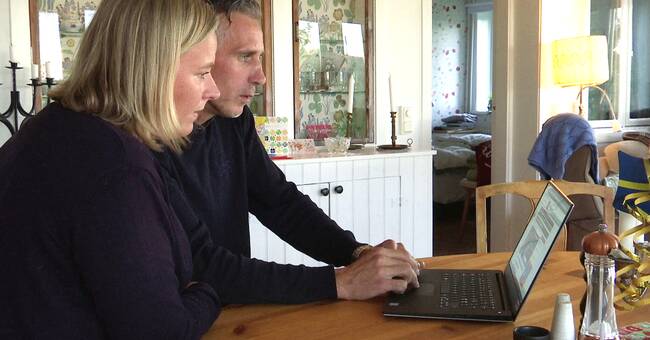Katarina and Gad Regius live with their four children on a farm in Stadra outside Nora.
Previously, they lived in Stockholm's inner city.
Now they may be forced to move again as they have lost almost all access to the internet.
As long as the old fixed telephone network remained, they could have a pretty good connection.
But Telia thought that the old telephone wires were too expensive to maintain and therefore the network was shut down.
"Major disturbances"
The alternative is mobile broadband, which can suffice for the simplest needs.
But for those who, for example, want to participate in video meetings or upload and download files, it is not enough.
The situation is especially serious now, when the coronavirus forces both adults and children to work and study from home to a large extent.
- For us, this has meant that we have gone from having a fairly stable connection to having large disturbances and a speed of only 2 to 4 megabits, says Katarina Regius.
- We can not do banking, the children can not download school information.
So those are big concerns.
Society is completely digitalized today.
Is it possible to stay here then?
"Doubtful, to put it bluntly," says Katarina Regius.
Direct report · How does the internet connection where you live affect your everyday life?
Post
Javascript needs to be enabled in your browser for this instant report to be updated automatically.
13 min08.16
I recently received an email response to what it would cost me who lives in Örebro to have open fiber withdrawn to the house in the new Hjärsta.
They take almost 35,000. This despite the fact that the area already has fiber and that the connection cabinet is about 8 meters from my house.
So I think this is a lie and a cursed poem.
These companies have a monopoly and earn a lot without government regulation.
In addition, they receive grants through our tax money.
They do not want to do much for the public good, I claim, only when they can earn a decent penny.
Agenda came and greeted thank you.
/ Mvh Mats
Mats Ekerbring
33 min07.57
When we moved into our current house (in the country), I contacted the municipality to find out how they think about their residents and their connection.
They happily replied that an agreement with a supplier had been concluded and that the start of the expansion was in full swing.
Shortly afterwards, we were contacted and were able to sign a contract for fiber.
It was almost three years ago and the only thing that happened is that we received two Mail where we are informed that the expansion has not started yet.
Our children are starting to get bigger and the lack of a fast and above all stable internet is reflected both in school and among friends.
Unfortunately, it is a big part of our everyday life and will certainly not get smaller.
Although we enjoy living in the country, we want the best for our children and thoughts of moving back into the city already exist.
Fredrik
2 tim06.12
Lives in a small town, but in a sparsely populated area.
Has internet via the telephone jack, works so far, but various strange 'interruptions' are being considered, for example the broadcasts from Svt are often interrupted at midnight.
Last night I chose to join streamed TV from Australia and can watch optional broadcasts from there (!) But not from Svt 24 hours a day.
Another thing, internet connection is today far too expensive, you have to cut down on food costs etc. to be able to afford.
It is inconceivable that this can be the case in today's Sweden.
Digital equality is closely linked to democratic rights that should be taken for granted.
Give discounts on subscriptions to the elderly as well as free courses and a heavily discounted tablet.
Anita

